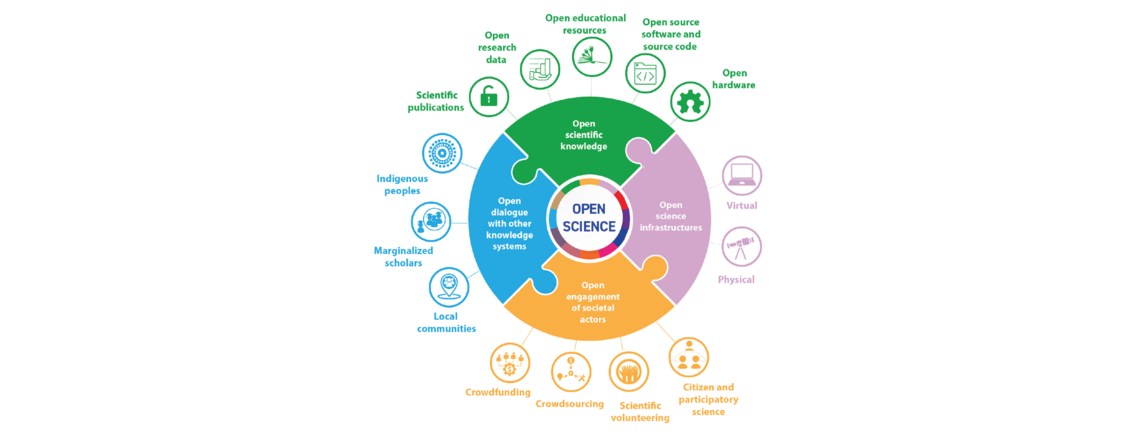Open Science
Knowledge to Impact

Making Scholarship as Open as Possible
Open science, also referred to as open scholarship, is a movement that promotes collaboration, transparency, accessibility and inclusivity in research inputs, processes and outputs. It includes all disciplines and aspects of scholarly practices, including basic and applied sciences, natural and social sciences and the humanities.
Open science has been widely accepted as critical to advancing science and society. The reproducibility and replicability crises demonstrated the importance of being able to duplicate and verify scientific results. Pandemics and other emergencies showed the urgent need for equitable and open sharing of scientific knowledge and global collaboration.
For scholarship to advance and address society’s complex problems, it also needs to engage with citizens, policymakers and other community members who are directly impacted by the research.
Canadian and international funders recognize the importance of open science, and expectations for research data management, open access, and other relevant areas are evolving.
What is (and isn’t) Open Science?
According to the UNESCO Recommendation on Open Science, open science is a set of principles and practices that aims to...
- increase collaborations and sharing of information
- make multilingual research from all fields openly available, accessible and reusable, and
- benefit researchers and society as a whole.
Open science aims to ensure that research knowledge is accessible and also that the production of that knowledge itself is inclusive, equitable, sustainable.
Values and Principles
Open science doesn’t intend to make all research indiscriminately open. “As open as possible” means aiming to be true to UNESCO’s principles and values for open science while being thoughtful about protecting the researcher’s legitimate interests and, for example, confidentiality, human rights, research security and Indigenous knowledge.
Because of its complexity, scholarly work may be somewhere along the path to "openness.” Open science may be incorporated to different extents in the overall research process (collaboration, inclusivity, etc.) as well as the research outputs (open data, open access publication, etc.).
Click image to enlarge
Pillars and Components
Open science builds on four key pillars: open scientific knowledge, open science infrastructures, open engagement of societal actors and open dialogue with other knowledge systems, each with a number of components.
Click image to enlarge
Open Science at UCalgary
University of Calgary has embraced open science as part of its Ahead of Tomorrow (2023-2030) Strategic Plan and within our Research and Innovation implementation plan. This work is rooted in UNESCO’s Recommendation on Open Science and the government of Canada’s Roadmap for Open Science. We are working together with our UCalgary community to build capacity and create a space in which all our scholars can increase the positive contributions of their work through understanding and engaging with open practices, values and principles.
Below are examples of some of the activities currently underway at the University of Calgary. This list will be developed further, in collaboration with our community, to reflect the full spectrum of activities across all UNESCO Open Science pillars, all scholarly activities, and in consideration of UCalgary’s strategic priorities.
If you are involved in open science initiatives at the university or would like to be involved in advancing open science at the university:
Contact: knowledge.impact@ucalgary.ca
Join: UCalgary Open Science Community
Open Science | Hotchkiss Brain Institute (HBI)
Open Services Suite | Libraries and Cultural Resources
Open Access | Libraries & Cultural Resources
Open Access and Scholarly Communication | Libraries and Cultural Resources
Open Education Resources | Libraries and Cultural Resources
PRISM Data Repository | Libraries and Cultural Resources
Open Educational Resources | Taylor Institute for Teaching and Learning
Open Access Publishing | University of Calgary Press
AuroraX Project | Auroral Imaging Group
Community Research Partnerships | Knowledge to Impact
Alberta Strategy for Patient-Oriented Research Support Unit
Citizen Science | Rothney Astrophysical Observatory
Other Open Science Resources
UNESCO Recommendation on Open Science
Canada’s Roadmap for Open Science
Tri-Agency Open Access Policy on Publications
What We Heard Report: Engagements on the review of the Tri-Agency Open Access Policy on Publications (2024)

Open Science Webinars
Open science intersects and overlaps with many areas which as a system, are critical to advancing research, trust in research, and research impacts. These webinars explore these ideas and guest speakers will share how they are actively incorporating open science into their own work.
View recordings and slides:
OPENsci '25 Webinar Series (2025)
Moving UCalgary Forward with Open Science (December 2024)


